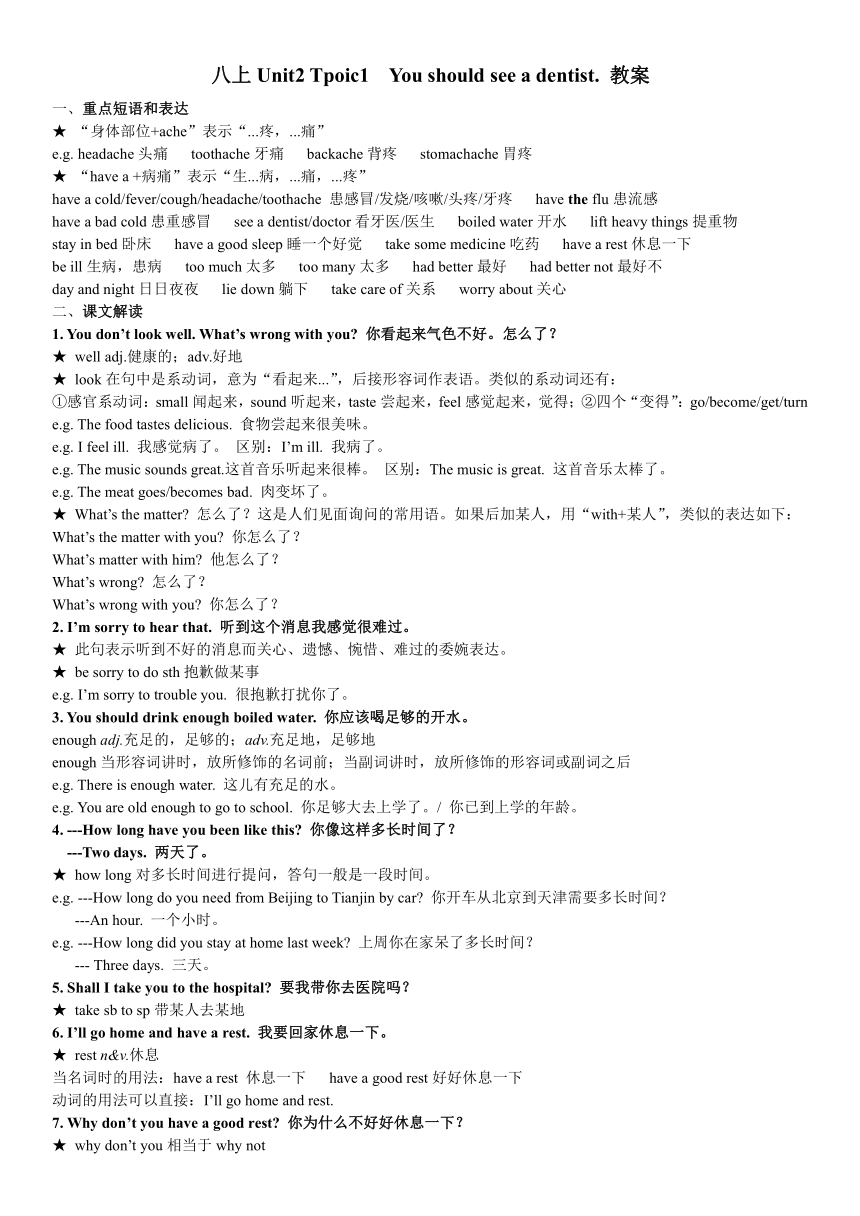
八上Unit2 Tpoic1 You should see a dentist. 教案 一、重点短语和表达 ★ “身体部位+ache”表示“...疼,...痛” e.g. headache头痛 toothache牙痛 backache背疼 stomachache胃疼 ★ “have a +病痛”表示“生...病,...痛,...疼” have a cold/fever/cough/headache/toothache 患感冒/发烧/咳嗽/头疼/牙疼 have the flu患流感 have a bad cold患重感冒 see a dentist/doctor看牙医/医生 boiled water开水 lift heavy things提重物 stay in bed卧床 have a good sleep睡一个好觉 take some medicine吃药 have a rest休息一下 be ill生病,患病 too much太多 too many太多 had better最好 had better not最好不 day and night日日夜夜 lie down躺下 take care of关系 worry about关心 二、课文解读 1. You don’t look well. What’s wrong with you? 你看起来气色不好。怎么了? ★ well adj.健康的;adv.好地 ★ look在句中是系动词,意为“看起来...”,后接形容词作表语。类似的系动词还有: ①感官系动词:small闻起来,sound听起来,taste尝起来,feel感觉起来,觉得;②四个“变得”:go/become/get/turn e.g. The food tastes delicious. 食物尝起来很美味。 e.g. I feel ill. 我感觉病了。 区别:I’m ill. 我病了。 e.g. The music sounds great.这首音乐听起来很棒。 区别:The music is great. 这首音乐太棒了。 e.g. The meat goes/becomes bad. 肉变坏了。 ★ What’s the matter? 怎么了?这是人们见面询问的常用语。如果后加某人,用“with+某人”,类似的表达如下: What’s the matter with you? 你怎么了? What’s matter with him? 他怎么了? What’s wrong? 怎么了? What’s wrong with you? 你怎么了? 2. I’m sorry to hear that. 听到这个消息我感觉很难过。 ★ 此句表示听到不好的消息而关心、遗憾、惋惜、难过的委婉表达。 ★ be sorry to do sth抱歉做某事 e.g. I’m sorry to trouble you. 很抱歉打扰你了。 3. You should drink enough boiled water. 你应该喝足够的开水。 enough adj.充足的,足够的;adv.充足地,足够地 enough当形容词讲时,放所修饰的名词前;当副词讲时,放所修饰的形容词或副词之后 e.g. There is enough water. 这儿有充足的水。 e.g. You are old enough to go to school. 你足够大去上学了。/ 你已到上学的年龄。 4. --How long have you been like this? 你像这样多长时间了? --Two days. 两天了。 ★ how long对多长时间进行提问,答句一般是一段时间。 e.g. --How long do you need from Beijing to Tianjin by car? 你开车从北京到天津需要多长时间? --An hour. 一个小时。 e.g. --How long did you stay at home last week? 上周你在家呆了多长时间? -- Three days. 三天。 5. Shall I take you to the hospital? 要我带你去医院吗? ★ take sb to sp带某人去某地 6. I’ll go home and have a rest. 我要回家休息一下。 ★ rest n&v.休息 当名词时的用法:have a rest 休息一下 have a good rest好好休息一下 动词的用法可以直接:I’ll go home and rest. 7. Why don’t you have a good rest? 你为什么不好好休息一下? ★ why don’t you相当于why not 8. You shouldn’t eat too much candy. 你不应该吃太多的糖。 too much “太多”,后接不可数名词 e.g. too much water太多的水 too many “太多”,后接可数名词 e.g. too many books太多的书 too many people太多的人 much too “太,很,非常” e.g. much too hurt 太疼了 9. 情态动词should, shouldn’t, had better, had better not的用法:本身的词义;后接动词原形do。 should “应该”, ... ...
~~ 您好,已阅读到文档的结尾了 ~~